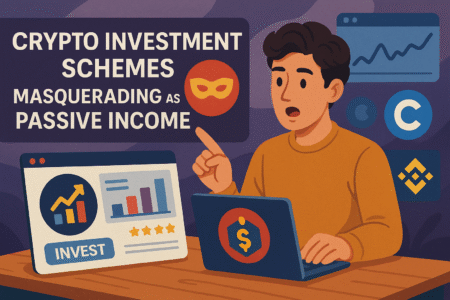Table of Contents
Some links on The Justifiable are affiliate links, meaning we may earn a small commission at no extra cost to you. Read full disclaimer.
Looking for online income money ideas but worried you’ll fall for a scam? You’re not alone—and your instincts are spot on. With the rise of remote work and digital side hustles, shady schemes are now disguised better than ever.
Ever wondered if that high-paying remote job is real? Or if that crypto investment you saw on Instagram could wipe out your savings? What about those “easy” affiliate programs or drop servicing blueprints? This guide exposes the most common traps so you know what to avoid—and where to actually look if you want real income online.
Let’s break down the five biggest scams fooling people right now and how to stay one step ahead.
1. Fake Work-From-Home Job Offers That Disappear Fast
Some of the worst online income money traps come in the form of fake remote job offers. These scams are cleverly disguised, often mimicking real companies or creating professional-looking websites to convince job seekers they’re legit.
Red Flags Hidden in Seemingly Legit Job Postings
It’s scary how real these scam listings can look. They use company logos, jargon-filled job descriptions, and even fake recruiter profiles. But once you look closer, cracks start to show.
Here are a few warning signs to watch out for:
- No interview or a rushed process: If you’re offered a job within minutes of applying or chatting, pause. Real employers vet candidates carefully.
- Vague job duties: If the job sounds too general (like “email handling” or “data entry” with no specifics), that’s a red flag.
- Upfront payments: Some scammers ask you to pay for “training,” software, or background checks. Legit employers cover these costs.
In my experience, if a job offer feels more like a sales pitch, that’s a sign something’s off. Trust your gut—it’s usually right.
How Scammers Lure Victims With Too-Good-To-Be-True Promises
Scammers know how to hit emotional triggers. They use flashy headlines like “Earn $5,000/month working 3 hours a day” to reel people in. Many target stay-at-home parents, college students, or anyone feeling financial pressure.
Here’s how the bait typically works:
- High income for low effort: Real jobs require real work. If it sounds too easy, it probably is.
- Urgency tactics: “Apply now—only 3 spots left!” creates pressure so you don’t stop to think critically.
- Fake success stories: They’ll often show photos, testimonials, or videos of happy “employees” making big money. Don’t trust it unless you can verify it.
These scams thrive on emotion—especially hope. The best defense is slowing down and doing your research before engaging further.
Safe Platforms You Can Trust for Remote Job Listings
There are legitimate places to find remote work—you just need to know where to look. Here are three platforms that prioritize job seeker safety:
- FlexJobs: Every listing is vetted for legitimacy. You won’t find scammy gigs here.
- We Work Remotely: Trusted by companies like Google and Amazon, this site specializes in remote-first companies.
- Remote OK: It clearly labels job types, company details, and even salary info, helping you make informed choices.
What I like about these platforms is their clear structure, strong filters, and real contact details. That kind of transparency makes a big difference.
Real Ways to Verify an Employer’s Credibility Online
Before accepting any remote job, it’s worth doing some detective work. Here’s how you can double-check whether a company or recruiter is legit:
- Search the company name + “scam” or “complaints”: This simple step can save you hours of grief.
- Check LinkedIn: Look up the recruiter or hiring manager. If their profile is empty or brand new, that’s a concern.
- Use WHOIS lookup tools: Websites like Whois.com let you see when a domain was created. If it’s just days old, that’s a major red flag.
You can also run the job description through Google to see if it’s been copy-pasted across scam boards. It’s not foolproof, but it’s a solid start.
2. Crypto Investment Schemes Masquerading as Passive Income

One of the fastest-growing online income money scams hides behind the promise of passive crypto wealth. These schemes often mimic legitimate blockchain projects but are built solely to drain your wallet or data.
Why “Guaranteed Returns” Are Always a Red Flag
No financial investment—especially in crypto—can guarantee returns. The market is volatile by nature, and any promise of fixed income is a huge warning sign.
Scammers use this tactic to build trust fast. You’ll hear phrases like:
- “Earn 20% ROI weekly”
- “100% guaranteed profit with zero risk”
- “Automated trading that never loses”
These claims are not just misleading—they’re mathematically impossible over time. In my experience, any project offering fixed profits in a variable market is either unsustainable or fake. Real crypto investing involves risk, research, and time.
Social Media Influencers Promoting Fake Crypto Projects
Influencers—especially on platforms like TikTok, Twitter, and YouTube—often promote what seem like quick crypto wins. Some are paid by shady projects, while others fall for scams themselves and unknowingly promote them.
You might see:
- Flashy videos with luxury lifestyles “funded by crypto”
- Endorsements without clear disclosures
- Pump-and-dump schemes masked as long-term holds
If an influencer isn’t explaining the tech, risks, or offering real analysis, be cautious. A few got caught pushing “rug pulls”—where the project vanishes overnight with investors’ money. Always ask: what’s in it for them?
Common Tactics Scammers Use to Steal Your Wallet Access
The real danger often lies in the wallets and access permissions. Some scams don’t ask for money directly—they just trick you into granting wallet access.
Here’s how they do it:
- Fake airdrops or giveaways that require wallet connection
- Malicious links that install browser extensions or malware
- Phishing emails or fake DApps (decentralized apps) mimicking real ones
You should never connect your wallet to a site you haven’t verified. Use tools like Etherscan or BscScan to track contracts and activity. If something feels off, it probably is.
Where to Research Legitimate Blockchain Opportunities
If you’re truly interested in earning through crypto, there are smarter paths. Here are trusted places to do your research:
- CoinMarketCap & CoinGecko: Great for tracking real-time project data, history, and community trust.
- Crypto Twitter and Reddit: While noisy, they can help surface red flags early if you follow the right voices.
- Whitepapers & GitHub Repos: Every serious project should have transparent documentation and open-source code.
I suggest you dig into a project’s team, tokenomics, and roadmap. If none of that’s easy to find or sounds like vague hype—walk away.
3. Affiliate Programs With Zero Transparency or Tracking
Affiliate marketing can be a legit way to build online income money, but some programs are built more like traps. If the tracking system is vague, payouts are delayed, or terms are hidden—it’s likely a scam.
How Fake Programs Use Vanity Metrics to Deceive You
Scammy affiliate networks often lure creators with flashy dashboards that show fake clicks, sign-ups, or “estimated earnings” that never get paid out.
What to watch out for:
- Metrics without timestamps or sources
- Earnings that keep increasing but never unlock for payout
- Fake testimonials with no link to actual users
One creator I know spent months promoting a tool that looked promising—only to realize the backend data was entirely fabricated. These schemes often just want you to drive real traffic for free.
Signs an Affiliate Network Is Just a Payout Scam
A true red flag is when an affiliate program makes it intentionally hard to withdraw money or contact support.
You may notice:
- High payout thresholds ($500+) with slow or no support
- No clear terms of service
- Hidden deductions that shrink your commissions right before payout
I’ve seen cases where networks use delay tactics—like “manual review” or “fraud detection checks”—just to avoid paying. If others are complaining online, take those reviews seriously.
Legitimate Networks That Offer Real-Time Tracking and Payouts
Not every affiliate program is a scam. Some of the most trusted ones are transparent, data-rich, and pay on time.
Here are a few examples:
- Impact.com: Offers detailed tracking, custom links, and scheduled payouts.
- Flexoffers: A well-established network with tons of merchant options and low payout minimums.
- PartnerStack: Known for software and SaaS partnerships, it also provides clean dashboards and fast payouts.
Look for platforms that allow you to track clicks, conversions, and commissions all in one place—without playing guessing games.
Questions You Must Ask Before Joining Any Affiliate Platform
Before promoting anything, here’s what I recommend asking:
- Can I clearly see the tracking and reporting process?
- What’s the payout schedule and method (PayPal, bank, crypto)?
- Are there reviews or case studies from actual users?
- What’s the company’s contact info and support response time?
If you can’t get straight answers, that’s your answer. Transparency isn’t optional—it’s essential.
4. Drop Servicing Courses That Sell Pipe Dreams, Not Skills

Many online income money scams now disguise themselves as trendy business models, and drop servicing is a prime example. It sounds clever—reselling services for profit without doing the work—but the way it’s sold often does more harm than good.
The Business Model Behind Most Drop Servicing Scams
At its core, drop servicing isn’t inherently bad. You market a service, outsource the delivery, and profit from the margin. The issue lies in how it’s packaged and sold.
Most scam versions follow this pattern:
- Sell a “done-for-you” website with pre-written service packages
- Push you to run paid ads immediately with zero experience
- Promise six figures with no real client management or service knowledge
In reality, success in drop servicing demands strong marketing, client handling, and operations. When a course skips those and focuses only on “flipping services,” it’s setting you up for disappointment.
How to Spot Coaches Selling Lifestyle Over Knowledge
The worst drop servicing sellers market dreams, not skills. They flaunt cars, villas, and Stripe screenshots—but rarely show real client case studies or fulfilled projects.
Be skeptical if:
- There’s more footage of luxury life than actual service tutorials
- The course lacks detail on team building, quality control, or client retention
- You can’t find any student success stories beyond testimonials on their site
I’ve seen people burn thousands on these “mentors” only to realize they never actually delivered a service themselves. Ask yourself: is this person teaching or just flexing?
Why Real Drop Servicing Requires More Than Just a Website
Even with a sleek website, drop servicing won’t work if you don’t understand the service you’re selling. If you can’t vet freelancers, explain deliverables, or handle revisions, clients will notice—and leave.
Here’s what you actually need:
- A niche with measurable demand (e.g. podcast editing, SEO audits)
- Reliable contractors you’ve tested—not random Fiverr picks
- Clear SOPs for delivery, communication, and revisions
Think of it less like passive income, and more like project management. Without that mindset, even the best-looking site won’t convert.
Free Resources That Teach You Real Digital Service Skills
If you’re serious about earning from drop servicing, skip the overpriced courses and build your skill set instead. Here are some genuinely helpful resources:
- Google Digital Garage: Free courses on marketing, analytics, and project management.
- Coursera & edX: University-level courses on business operations, service design, and customer success.
- HubSpot Academy: Free certifications in email marketing, inbound sales, and customer service.
Mastering even one of these areas puts you ahead of 90% of drop servicing sellers who rely on generic templates and hope.
5. Pay-to-Play “Online Income Systems” With No Real Product
A disturbing number of online income money systems are built on promises—not products. These models require you to buy in, recruit others, and sell access to the same system you just joined. It’s a slick pyramid with a digital makeover.
Breaking Down the Pyramid Structures in Disguise
These programs often market themselves as “business-in-a-box,” offering digital training, lead funnels, or automated income strategies. But look closer, and you’ll see there’s no product—just layers of resellers.
Here’s how they usually work:
- You pay a fee to join and access “training” and affiliate links
- You earn commissions only when others buy the same system
- Everyone’s just reselling access, not value
What you get isn’t a business—it’s a loop. And when new sign-ups dry up, so does your income. The structure thrives only as long as fresh people keep joining.
Why Upfront Fees for Vague Access Always Signal Trouble
Legitimate businesses might charge for tools or coaching—but they tell you exactly what you’re getting. Scam systems are fuzzy on details and emphasize urgency over clarity.
Watch out if:
- You’re asked to pay before seeing what the product actually includes
- The “value” is mostly PDFs, webinars, and motivational fluff
- The refund policy is complicated or non-existent
One red flag I’ve seen is when testimonials focus on feelings—not facts. “I feel like this is the breakthrough I needed” is not proof the system works.
Testimonies, Not Evidence: How Scammers Exploit Social Proof
Social proof is powerful—but it’s also easy to fake. Some of these systems use actors, stock footage, or recycled reviews from other schemes.
Here’s what to question:
- Are the people shown real, with verifiable profiles?
- Can you find external reviews or watchdog reports?
- Are results specific or just generic praise?
I recommend reverse image searching photos or checking reviews on Reddit. If a system looks polished but feedback elsewhere is nonexistent or negative, trust that.
Safer Business Models That Don’t Require Paying to Join
If you’re looking to build online income without falling into a pay-to-play trap, there are honest alternatives that require skill, not startup fees.
Here are some options:
- Freelancing: Platforms like Upwork and Fiverr let you start earning with no upfront investment.
- Content creation: Build authority through blogs, YouTube, or newsletters—then monetize with ads or affiliate marketing.
- Digital products: Write an ebook, build a template, or teach a course on something you actually know.
The real path to income online isn’t gated—it’s earned. And you shouldn’t have to pay someone just to get your foot in the door.
I’m Juxhin, the voice behind The Justifiable.
I’ve spent 6+ years building blogs, managing affiliate campaigns, and testing the messy world of online business. Here, I cut the fluff and share the strategies that actually move the needle — so you can build income that’s sustainable, not speculative.






